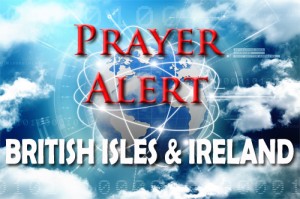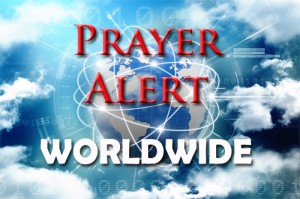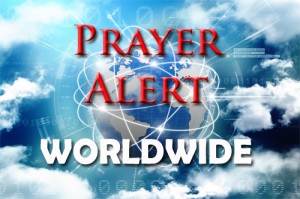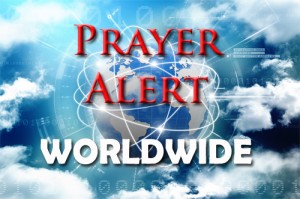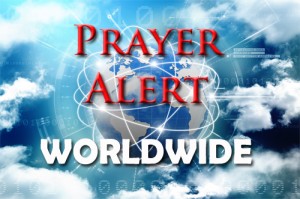
David Fletcher
David Fletcher is Prayer Alert’s Editor.
He is part of a voluntary team who research, proof-read and publish Prayer Alert each week.
If you would like to make a donation towards our running costs, please click here.
Last year Prayer Alert highlighted an application to draw attention to homelessness in London through a bronze sculpture. Huddled figures on park benches are a common sight in Westminster, but the plan to draw attention to homelessness with an evocative statue in the heart of the political establishment was met with a curt rebuff from the London borough. The sculpture depicts a figure shrouded in a blanket and stretched out on a bench. The only clues to the person’s identity are his feet, poking out and bearing visible wounds of crucifixion. Casts of the sculpture are displayed at the Vatican, in Dublin, Madrid, Washington and Toronto. Pope Francis blessed the artwork in 2013, saying it was a ‘beautiful and excellent representation of Jesus’. More than 850 people have backed a petition aimed at persuading the council to overturn its decision, while the Methodist Church is likely to appeal. Westminster has the highest population of homeless people in the UK.
Israel bombed five targets in Gaza after Hamas fired more than five mortar rounds into Israel in 24 hours - an escalation attributed to Israel’s intensified efforts to detect and destroy Hamas’ underground tunnels toward and across its border. Israel’s warplanes struck five targets near the town of Rafah on Wednesday evening. No injuries have been reported yet. An Israel Defence Forces (IDF) spokesman, Lt Col Peter Lerner, said that Israel ‘will continue to operate in order to protect the civilians of Israel from all Hamas’ terrorist threats above and beneath ground. Our efforts to destroy Hamas terror tunnel networks, a grave violation of Israel’s sovereignty, will not be deterred.’ Shortly before launching the strikes, Israeli officials warned Hamas to cease firing mortars at its troops on the Gaza border or face a strong military retaliation.
The Canadian province of Alberta was under a full state of emergency on Wednesday as a catastrophic wildfire continued to devour neighbourhoods in Fort McMurray, where 80,000 residents were safely evacuated. By Wednesday afternoon, the fire had scorched 18,500 acres; by mid-evening, it was expected to be more than 24,700 acres - authorities earlier had cited higher numbers in both cases. To date 88,000 people have been evacuated from a ‘nasty, dirty fire’, which the fire chief warned would be looking for even more areas of the city to destroy. The situation is unstable with dangerously high temperatures, relatively low humidity, and strong winds. A record high of 90 degrees Celsius was recorded on Tuesday. Pray for the allocation of emergency funding for the Red Cross to support evacuees directly. Pray also for the thousands of evacuees escaping - given only half an hour’s notice to collect valuables and leave.
A TV show had an Anglican minister live with a same-sex couple for ten days. How would a Christian who opposes same-sex marriage engage with two atheists and activists who invited him to their wedding? Rev David Ould had a same-sex couple live with him and his family for a few days; then he spent a few days living with them. The programme featured the three interacting and discussing their differences. Michael and Gregory went to church with David. David went to their wedding in New Zealand and marched in a gay pride parade; he displayed grace and honesty, holding fast to Christian orthodoxy on sexual morals and marriage. Michael and Gregory were not able to understand the Christian opposition to same-sex marriage and David was unable to agree to the moral basis of homosexuality and its claim on marriage. He showed that holding to truth is not easy and it opens us up to misunderstanding and even sarcasm. In short, there is usually a price to pay.
The United States is a nation with rich farmland, abundant resources, and a literate and educated population. It is a democratic republic with a constitution that guarantees freedom of speech. Yet the culture foundations have been eroding for decades. The systematic dismissal of God in society has led to increasing violence, rampant corruption, normalised immorality, and widespread spiritual apathy. When the foundations are being destroyed, what can the righteous do? (Ps. 11:3) We can pray. Across America, and the world, believers humbly interceded on behalf of the United States on Thursday. The USA stands at a critical moment in history. Although the vigil will have ended by the time this article is read, we can still join them and pray for Godly leaders to arise in churches, government, and society. Pray for national repentance of sin, immorality, and selfishness. Pray for an outpouring of the Holy Spirit on the Church, bringing another Great Awakening.
Hindu fundamentalists vandalised a church in Chhattisgarh during the Sunday service, forcing believers to chant ‘Praise the name of God Ram’. They then captured the pastor, Deenanath, and his seven-month pregnant wife and threw gasoline on them, trying to set them ablaze before vandalising the church and burning the Bible. In another story, Meena and Sunita came to faith through a Christian radio programme and worshipped in secret, listening to broadcasts. When they were baptised and started to visit church services, persecution began. The entire village rejected them, refusing food, clothing and even right of way in the streets. They ran away after a particularly nasty incident and were chased by Hindus shouting ‘Where are they? Burn them! Burn them!’ Both sisters still live in hiding, Open Doors is assisting with necessary supplies. Pray for God to strengthen and protect Christians in many of India’s states who are experiencing intimidation and violence. Pray for indigenous Christians and foreign missionaries to minister safely and reap miraculous results.
Zimbabwe’s ten national parks are famed for their huge populations of elephants, lions, rhinos, leopards and buffaloes; but on Tuesday they put their wild animals up for sale to save them from a devastating drought. The Parks and Wildlife Management Authority said, ‘Members of the public with the capacity to acquire and manage wildlife - and enough land to hold the animals - should get in touch to register an interest.’ The drought is expected to worsen an already critical water shortage. Further north, Ethiopia is in the midst of the worst drought in fifty years, affecting over half of the country’s 750 districts. Earlier this month, the United Nations Office for the Coordination of Humanitarian Affairs called Ethiopia’s condition ‘a deteriorated humanitarian situation’. Ethiopia is a victim of land degradation, due to increased use of unsustainable agricultural practices. Grazing animals and firewood collection haven’t helped, causing decreased protection against erosion with soil easily washed away. See also
International Olympic Committee officials say preparations for the Olympic Games are the ‘worst ever’. The situation is critical on the ground, there is no plan B and they are not ready in many, many ways.The latest warning is all the more significant for coming from inside the IOC. The work has been troubled by construction delays and mass protests. The unwieldy relationships between the city, state and national governments and the ambitious nature of the plans have caused delays and discord. There are also ‘social issues that need addressing’. Hosting the Olympics was designed to showcase Brazil's confidence as one of the fastest growing world economies and turbocharge long-overdue improvement to the city's infrastructure. But negative headlines about the readiness of facilities has dented confidence in its ability to deliver.
District Court Judge Lou Olivera presides over a treatment court for veterans with mental health issues in North Carolina. Sergeant Joseph Serna had been through a lot and earned three Purple Hearts, but suffers from post-traumatic stress disorder. He recently came to Judge Olivera’s court charged with driving ‘under the influence’, even though he has fought to stay sober. He confessed to Olivera that he had lied about a recent urine test. In response Olivera sentenced Serna to one day in jail, drove him to the jail, and spent the 24-hour sentence with him. ‘When Joe first came to turn himself in, he was trembling,’ Olivera said. ‘I decided that I’d spend the night serving with him.’ As Serna sat down on the cot in his cell, the door rattled open again and Olivera came in and sat down beside him. Serna said, ‘Are you here for the entire time with me?’ He replied, ‘Yeah, that’s what I am doing.'
‘I was with my family, whom I hadn't seen in 13 weeks, and was soon to graduate from the Marine Corps boot camp in San Diego, California, when a man walked up and thanked me for helping his son return to the Lord. While in the service, I found myself witnessing in many non-traditional forms. I led a prayer group at boot camp and marched recruits to chapel services, all as a previously burned-out youth pastor with plans to become a chaplain. Later, while I was training for deployment to Iraq as a field radio operator, a close friend of mine gave me the call sign “Preach”, which stuck. The call sign was a term of endearment as well as a fresh reminder of God's call on my life. I was amazed to experience first-hand the fulfilment of the prophecies in Joel 2:28-29 and Acts 2:17-19. Wherever I went, I witnessed God speaking to men and women in uniform. He even spoke in dreams to fellow infantrymen while they were on training operations in the field leading up to deployment.’

